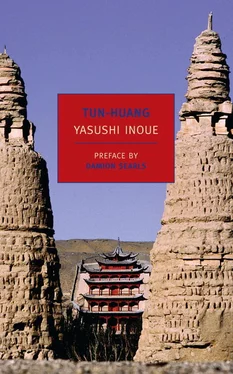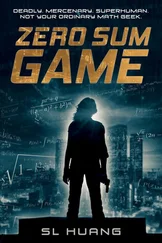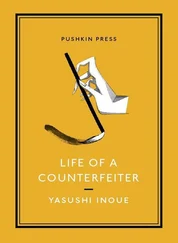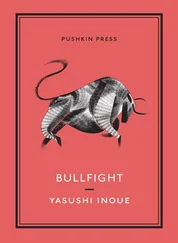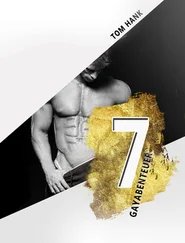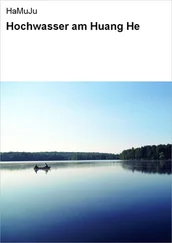Arrows continued to rain on the now disorganized unit. Human cries and the neighing of horses rose from the dusty mass. Beyond this single area the plains were completely silent. The skies were blue and clear. Billowy clouds dotted the horizon like bits of cotton. The winter sun shone on the plains. Arrows were continually shot. Hsing-te was not aware of how much time had elapsed when he suddenly heard tumultuous shouting from below the wall. He rushed down. Later, he could not recall straddling his horse. To his right and left were cavalry troops flailing their swords about. Hsing-te felt his horse rear, fall forward, then rise again. On the ground, the bodies of Hsi-hsia soldiers and horses were piled up and scattered about the whole area.
The field of corpses continued for quite some distance. But when he had finally passed beyond it, Hsing-te saw in the far distance ahead of him the retreating Hsi-hsia cavalry, spread over the plain as they dispersed and fled.
“Is Yüan-hao here? Find Yüan-hao!” Hsing-te suddenly heard Wang-li’s rasping voice. He stopped his horse. The cavalry unit ceased to pursue the enemy and returned to the corner of the plain where hundreds of Hsi-hsia casualties lay.
“Is Yüan-hao here? Find him!” Wang-li shouted as he rode through the field of dead and injured. Many soldiers dismounted, pulled up the dead and injured and looked at their faces for Yüan-hao. This continued for quite some time, but the men were unable to locate Yüan-hao’s body among the corpses.
As soon as he learned that Yüan-hao’s corpse was not there, Wang-li immediately drew his troops back into the city. It was obvious that Yüan-hao, the master strategist, would counterattack with fresh troops without wasting any time. The retreating cavalry alone numbered over two thousand, and it was also evident that several large forces had followed Yüan-hao’s army at intervals and were advancing into the area.
When Hsing-te returned to the city, the tumult caused by the hundred Hsi-hsia vanguard cavalrymen had subsided, and they had been disarmed and gathered together in a square.
Wang-li ordered his men to hurry and send the clamoring refugees out of the gate. The troops were also planning to evacuate after the civilians had left the city. Before much had been accomplished, however, they were forced to abandon this plan. The guards were bringing in reports that numerous small units had been sighted coming toward them from the east and south.
Hsing-te went up the wall again. It was just as the sentries had said. Dust clouds showing the enemy’s presence were rising everywhere on the distant plains. They were clearly groups of men and horses. Wang-li also came to the top of the wall, but he did not appear to be particularly disturbed.
“Probably those bastards will advance to a certain point, stop there, and will not come any closer. Then they’ll wait for nightfall. When night comes, they’ll attack us. We’ll stay here until nightfall, then we’ll evacuate,” said Wang-li. Hsing-te bent close toward Wang-li to hear him. “Luck is with that bastard,” Wang-li continued. “But I won’t die until I get him. And don’t you die, either!”
Wang-li’s eyes blazed. Just as he had predicted, the countless units scattered about were seen to stop at a prearranged spot on the plains in the distance. They did not approach any closer.
The short day ended and dusk began to fall. As soon as night had come, the interrupted evacuation of civilians was to resume. But the Hsi-hsia attack began before nightfall, a little earlier than Wang-li had anticipated.
Arrows began to fall into the city. Their strength was weak, but then they showered continuously throughout the city. Most of them fell onto the ground or horizontally on buildings, as though blown by the wind. Confusion spread among the civilians. Women and children wept and wailed and ran around erratically.
As evening closed in, West Gate was opened and the refugees began to spill forth from the city. At about the same time, flaming arrows poured over the walls. Just as the Kua-chou population could not wait for nightfall to evacuate, it seemed that the enemy could not hold off their attack until then either.
Once the flaming arrows began to descend, the attack increased in intensity by the minute. The gradual advance of the Hsi-hsia units toward the city was apparent. The area around West Gate was jammed with refugees. Only in the west were there no enemies, and therefore they were forced to use only this gate.
The less than two thousand troops in the city were assigned to defend the three gates, shooting arrows at the spots where the flaming arrows originated, but their efforts merely seemed to check the enemy from rushing the wall.
Wang-li inspected the three gates in turn and directed the fighting, while Hsing-te remained at West Gate and occupied himself with evacuating the natives. While this was going on, Hsing-te saw that the darkness was suddenly lifted from the town. Buildings seemed to float up, the long road stood out nakedly and the jostling figures were brightly illuminated. Just as a continuous shower of arrows had converged on the Hsi-hsia guards earlier that day, flaming arrows now rained down into the town from all directions.
“Aaaaah! Kua-chou will burn. The houses will burn. The city will burn.” Hsing-te instinctively turned toward the voice. He saw Governor Yen-hui, whose uplifted, wrinkled face reflected such bright crimson that it looked as though it was on fire.
“So you’re still here!” Hsing-te unconsciously exclaimed. He had thought that no matter what happened, the governor would have left by now. What had Yen-hui been doing? He did not carry a single item as he stood pressed in among the crowd.
“Oh, the temples will burn — the sutras will burn!” When he heard these words, Hsing-te was suddenly reminded of the translation wing of Yen-hui’s palace.
“What happened to the men in the translation hall?”
Yen-hui ignored the question and repeated, “Oh, the city will burn, the houses will burn!”
Hsing-te left West Gate and ran toward Yen-hui’s palace. He was concerned about the six Chinese who worked in the translation hall and their completed sutras. The roads were bright. Flames were rising from several locations. In the light of the fires, he could distinguish single grains of sand on the ground. After he had turned two or three corners, he suddenly found himself alone.
After he had gone a short distance, a troop of cavalrymen passed him. In all probability, the evacuation order had been given, and they were all on their way to West Gate. Twenty, then thirty cavalrymen passed him in succession. Each man’s face reflected an eerie crimson light.
Hsing-te cut across the garden of Yen-hui’s abandoned palace and ran into the translation hall. It had been bright outside, but the interior of the palace was dark. He saw no one. Hsing-te went directly to the cabinet where the translated sutras and copy scrolls were stored. When he opened the door, he found that the twenty-odd rolls which should have been there were gone. They had all been taken out. At this moment translating Chinese sutras into the enemy’s language seemed strangely out of keeping, and Hsing-te’s attachment to this work was also peculiar. However, Hsing-te himself felt no sense of contradiction. In the first place, he had never intended to do this work for the Hsi-hsia. Yen-hui had said that it was to be an offering to Buddha, but Hsing-te had worked only for the young girl of Kan-chou.
Hsing-te left immediately. Yen-hui’s palace had also caught fire and embers were scattering in all directions. On his way back, Hsing-te was forced to take many detours. Flames rose into the sky all over the city.
When Hsing-te finally reached West Gate, a unit of one hundred cavalry troops was about to leave. They were the last evacuees. One of the soldiers gave Hsing-te a horse, which he mounted, and then rode out through the gate. Just outside, the last evacuees formed into groups of four or five and then set off. For almost half an hour as they rode, the plains were bright, as if in the afterglow of sunset.
Читать дальше
